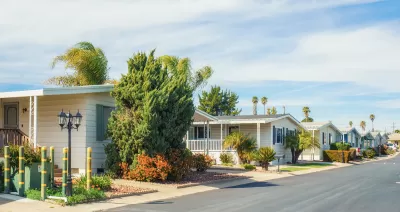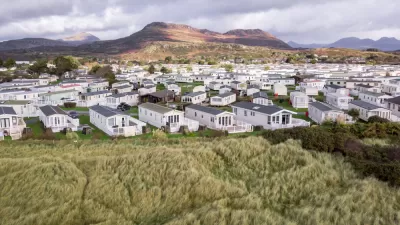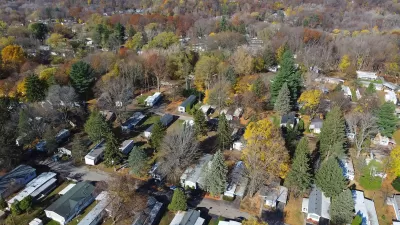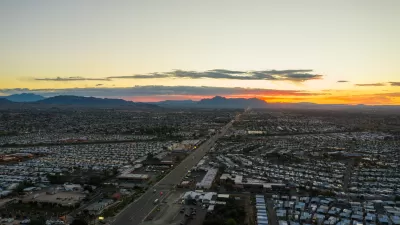Cooperative ownership can provide housing stability for low-income residents and protect them from land rent spikes and poor management.

In an article for the Daily Yonder, Lia Kvatum highlights the benefits of resident-owned mobile home parks, which provide added housing security for low-income households.
Resident-owned parks are one solution to a growing affordability crisis in the sector, where institutional investors have been buying up mobile home parks and raising land rents, forcing former residents out. As Kvatum explains, “In a resident-owned community, residents own and manage the property cooperatively. Residents get a say in setting rent and investing in upkeep and improvements.”
Mobile home parks, while often overlooked, are an important source of affordable housing. “A 2023 article in the Journal of the American Planning Association found that ‘more Americans live in manufactured housing than in public and federally subsidized rental housing combined.’”
To date, nineteen states have legislation that offers residents some protection when a manufactured home park goes up for sale, but those don’t include the states with the highest number of mobile home parks. “According to Carolyn Carter at the National Consumer Law Center, only eight states have “strong” protections for residents when a community is sold.”
Meanwhile, the loans available to manufactured housing residents are more like car loans than home mortgages, meaning rates are typically higher. “And because in most states they are not considered houses but vehicles, owners don’t qualify for home equity loans for any improvements they make.”
FULL STORY: Building Stability Through Resident-Owned Mobile Home Parks

Study: Maui’s Plan to Convert Vacation Rentals to Long-Term Housing Could Cause Nearly $1 Billion Economic Loss
The plan would reduce visitor accommodation by 25% resulting in 1,900 jobs lost.

Alabama: Trump Terminates Settlements for Black Communities Harmed By Raw Sewage
Trump deemed the landmark civil rights agreement “illegal DEI and environmental justice policy.”

Why Should We Subsidize Public Transportation?
Many public transit agencies face financial stress due to rising costs, declining fare revenue, and declining subsidies. Transit advocates must provide a strong business case for increasing public transit funding.

Paris Bike Boom Leads to Steep Drop in Air Pollution
The French city’s air quality has improved dramatically in the past 20 years, coinciding with a growth in cycling.

Why Housing Costs More to Build in California Than in Texas
Hard costs like labor and materials combined with ‘soft’ costs such as permitting make building in the San Francisco Bay Area almost three times as costly as in Texas cities.

San Diego County Sees a Rise in Urban Coyotes
San Diego County experiences a rise in urban coyotes, as sightings become prevalent throughout its urban neighbourhoods and surrounding areas.
Urban Design for Planners 1: Software Tools
This six-course series explores essential urban design concepts using open source software and equips planners with the tools they need to participate fully in the urban design process.
Planning for Universal Design
Learn the tools for implementing Universal Design in planning regulations.
Smith Gee Studio
Alamo Area Metropolitan Planning Organization
City of Santa Clarita
Institute for Housing and Urban Development Studies (IHS)
City of Grandview
Harvard GSD Executive Education
Toledo-Lucas County Plan Commissions
Salt Lake City
NYU Wagner Graduate School of Public Service





























